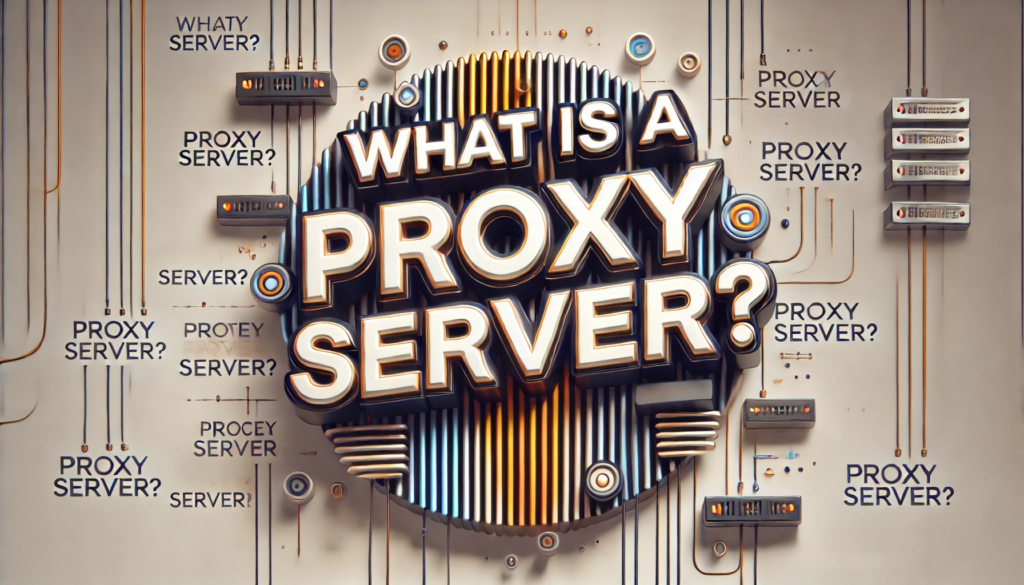
In today’s digital age, protecting online privacy and managing internet traffic are more important than ever. Proxy server is an essential resource if you’re looking to browse anonymously, access restricted content, or secure your data. However, with so many options available, choosing the right proxy server can be challenging. This blog will explore the basics of proxy servers, explain their different types, highlight why they are essential for online activities and offer tips on choosing the right proxy server for your needs.
What is a Proxy Server?

A proxy server acts as an intermediary between your device and the internet. When you connect to the internet, your device sends requests for data to websites or online services. Usually, these requests go directly to the server website hosting. However, when make use of proxy server, your requests are first sent to the proxy server, which then forwards them to the website server on your behalf. The website’s response follows the same path: it is sent to the proxy server, which relays it to your device.
In essence, a proxy server masks your IP address with its own. This provides a layer of anonymity, as the website you’re visiting only sees the proxy server’s IP address and not your device’s.
Types of Proxy Servers
There are various types of proxy servers, each serving a different purpose. Let’s look at the most common ones:
- Forward Proxy: This is the most common type of proxy. It sits between the user and the internet, forwarding requests from the user to the web. Forward proxies are often used in schools, workplaces, and homes to filter content and manage internet usage.
- Reverse Proxy: A reverse proxy works on the server side. It handles incoming user requests and forwards them to different servers behind it. Websites often use this to distribute traffic across multiple servers, improving load times and providing a layer of security.
- SOCKS Proxy: SOCKS (Socket Secure) proxies are versatile and can handle any type of traffic, whether HTTP, FTP, or email. They’re often used for activities requiring high privacy levels, like torrenting.
- Transparent Proxy: A transparent proxy doesn’t hide your IP address. Websites know you’re using a proxy and can see your IP address. These are often used for content filtering, such as blocking access to specific websites in schools or workplaces.
- Anonymous Proxy: As the name suggests, this type of proxy conceals your IP address from the websites you access. It provides an extra layer of privacy, making it difficult for websites to monitor your online activities.
- High Anonymity Proxy (Elite Proxy): High anonymity proxies take privacy to the next level. They hide your IP address and do not identify themselves as proxy servers. As a result, websites have no way of knowing that you’re using a proxy, providing a high level of anonymity.
Each proxy serves different purposes and offers unique advantages. Choosing SOCKS proxies is more flexible and can carry any type of data traffic, including email and FTP, making them useful for higher-level tasks. They are most efficient when you need IPs, which include scraping websites and managing multiple social media accounts. Knowing the different features in SOCKS will allow you to buy socks5 proxy that fits your individual needs.
Why Use a Proxy Server?

There are several reasons why you might want to use a proxy server:
- Privacy and Anonymity: A proxy server can protect your online activities by masking your IP address. This is particularly useful if you’re accessing sensitive information or want to prevent websites from tracking your browsing habits.
- Security: Proxy servers can put an extra layer of protection, especially in a corporate environment. They can filter out harmful websites, block malware, and prevent unauthorised access to your network.
- Access to Restricted Content: Some websites and online services are restricted based on your geographical location. A proxy server allows you to overcome these restrictions by making it appear like you’re accessing the internet from a different location.
- Improved Performance: Some proxy servers cache copies of popular websites. When you request a cached site, the proxy server can load it from its cache instead of fetching it from the internet, which can speed up your browsing experience.
- Control and Monitoring: In schools and workplaces, proxy servers are often used to monitor and control internet usage. Administrators can block access to certain websites, limit bandwidth, and monitor what users are doing online.
How to Choose the Right Proxy Server?

Proxies have become an essential tool for use in the modern age across businesses and individuals. Choosing a suitable proxy is essential for privacy, security, and better performance. Here are a few tips when selecting your ideal proxy to ensure it aligns with your proxy needs.
Assessing Your Needs
Before selecting a proxy, clearly define your objectives. Are you aiming to enhance online privacy, bypass geo-restrictions, conduct market research, or automate tasks? Different needs will require different proxy solutions.
A business involving data scraping requires a proxy with a high anonymity level. Evaluate a range of options until you find the proxy that best meets your use case needs.
Performance & Speed Testing
Slow proxies can reduce your productivity and user experience. Choose high-bandwidth proxies to facilitate more data at once. Tasks requiring real-time data require low latency proxies, i.e. having minimum delay time for transmitting data.
Check if the proxy provider offers unlimited bandwidth and how they balance server loads. Providers that have several servers on more than one site traffic tend to get better performance. You ensure efficient and smooth operations by prioritising high-performance and speed proxies.
Ensuring Security and Privacy
Security and privacy are important when selecting a proxy. To protect your data, choose proxies that encrypt your data during transmission. This helps protect private data, including login information and financial records.
Furthermore, check whether your proxies offer IP masking to increase anonymity. Verify the proxy provider’s privacy policy to ensure they do not log your activities. A reliable proxy will prioritise user privacy and protect robust security measures to protect against potential threats.
Scalability & Reliability
When necessary, choose a proxy solution that scales well with traffic or the number of users. Seek providers that allow you to change plans when needed easily. Look into a proxy provider’s uptime guarantees and user reviews to gain insights into their reliability.
Buying socks5 proxy services with a significant uptime record and responsive support that responds on time is best. Ensuring your scalable and reliable proxy will provide a seamless and consistent experience.
Budgeting
Cost is an important consideration when selecting a proxy. When budgeting, compare the features and performance you need. More expensive proxies have faster speeds, better security, and higher-quality customer service.
However, you must thoroughly research and identify the provider that offers a good mix of prices vs. services provided in return. Certain providers have competitive per-minute rates and tiered pricing plans based on usage levels, so you can opt for the plan that fits your budget.
Server Locations
The location of the proxy server can greatly impact its performance and the content you can access. If you’re using a proxy to bypass geo-restrictions, you’ll want a server located in a country where the content is available. For example, if you’re trying to access a streaming service only available in the U.S., you’ll need a proxy server based in the U.S.
Research
Take the time to research the proxy service provider. How long have they been in business? Do they have a good reputation in the industry? Seek for reviews on independent websites and forums where users share their honest experiences. A little research can go a long way in helping you avoid unreliable or scammy proxy services.
Conclusion
Choosing the right proxy server is not a one-size-fits-all decision. It requires careful evaluation of your specific needs, the types of proxy servers available, and various factors like speed, security, reliability, and cost. By following the tips outlined in this guide, you’ll be better equipped to select a proxy server that meets your requirements and provides a secure, reliable, and efficient browsing experience.
Remember, the key to a successful proxy experience lies in understanding your requirements and conducting thorough research before choosing. With the right proxy server, you can enhance your online privacy, access restricted content, and manage your internet traffic more effectively.








No Comments